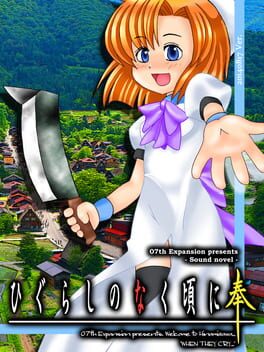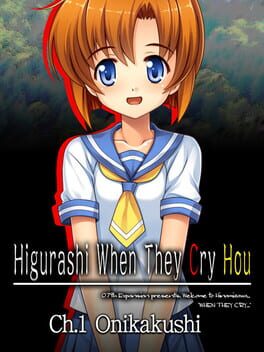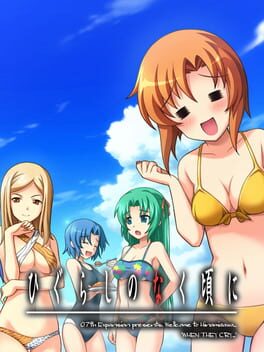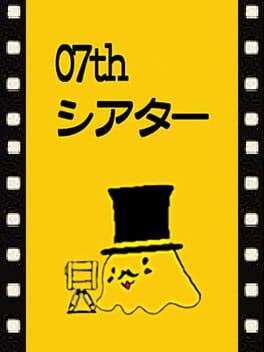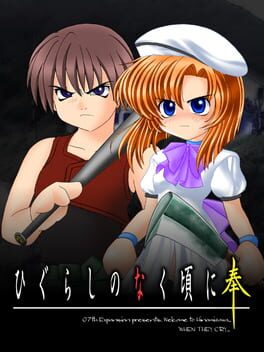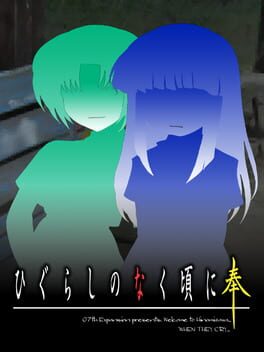Higurashi no Naku Koro ni Hou is a collection that contains all released visual novel content for the series thus far, as well as some additional content.
Also in series
Reviews View More
This review contains spoilers
“..This is a miracle. You noticed the sin you committed in another world. That’s impossible to do. But you did it. That is the most unbelievable and precious of miracles that could exist in this world…” - Rika Furude
At one point I had absolutely zero interest in visual novels. A few years ago I didn't even know what a visual novel was. I was honestly not very interested in anime or manga, but those things have changed now. I was initially turned off by stereotypical anime fans in America, which I don't really think I need to elaborate on.
A few friends of mine in a close-knit community - who I can now comfortably call the best friends that I have ever had - sort of warmed me up to aforementioned mediums knowing that I did not have much background in them, initially. None of it was forced; I'd like to think I'm quite open-minded so I figured, oh why the hell not. Let me just play a 150 hour visual novel and see what I think of it.
To keep it short, this game has changed my perspective on everything that surrounds me. At this point I’ve already jumped into Ryukishi’s next piece of work, Umineko: When They Cry.
Before I start pouring my heart into this thing, I’d ask you to give my dear friend カケラSKY’s review on Higurashi: When They Cry, which you can read here.
This is also the same person who helped me finish this game - I cannot thank them enough.
Ryukishi07 is a writer. He is the writer. He is the most prolific yet efficient writer that I have ever had the pleasure of reading. There are plenty of authors out there who manage to create these expansive worlds of lore and beautiful imagery, but Ryukishi07 is different. He is someone that can operate on a level of efficiency that is dare I say unmatchable. The toolset that he brings to the keyboard is one that I find a lot of writers lack, but yet it seems so obvious to do.
Ryukishi07 writes his characters with love.
There are a lot of characters within fictional mediums that more or less feel like a chore to believe in. Emotional appeal within writing is something that can be very hit or miss, and oftentimes more than not ruin a story for me. This is a problem that I find to be true in almost every video game I play. If you look at my top games, you’ll notice that aside from Higurashi, the only narrative that has much of an emotional core is Final Fantasy VII. (You could argue about Fallout: New Vegas being emotional at parts, but it isn’t something that’s necessary in order to play or finish the game). Higurashi’s cast feels effortless as far as emotional appeal goes. To remind you, I straight up don’t like most anime. I find the writing abysmal and I can’t find emotional ground in any of the characters that surround me. It’s exhausting, and I’ll be the first to admit that it’s a problem for me rather than the medium itself. Maybe it’s just a problem with writing adult characters. Adults are confusing on an emotional level. I witness it everyday within my own life, and I see it in many others too. Children for the most part I feel are pretty straightforward in their emotions. They often say things as they see it, without taking other’s feelings into account. Which makes sense, they’re not self-aware yet at their age and not the best at realizing how what they say may impact others on an emotional level.
What I find interesting about Ryukishi07 is that this concept is flipped around entirely. The children of Hinamizawa are at an age where they’re able to communicate properly, realize their emotions, and solve problems together. This does not, however, exist in a vacuum. There was a cost that was made to be able for these children to get to this point.
Furthering through the questions arc of Higurashi: When They Cry, we see the trauma and internal emotions of these characters on an individual level. Speaking from experience here, trauma is a blessing and a curse. The curse is of course the trauma that you are dealt. Trauma is not an ideal scenario to have in your life. Trauma is, however, a learning experience. There are certain instances of trauma that put you in a position that you need to grow up faster than others. I remember being in this spot when my mother died. I was 12 years old, all of my friends around me were still kids, and I felt like I was trying to advance my life much faster than them, while simultaneously trying to hold onto my childhood without completely saying goodbye to it. I had a long road ahead of me, but for the sake of trauma, I had to develop my emotions a lot faster and further than most other people around my age at the time, and so I just had to deal with it. I don’t think that this is talked about nearly enough when pieces of art deal with the subject of trauma, and I don’t think it’s recognized nearly enough in the mental health community, professionally. Ryukishi understands this without actually ever directly saying this. Despite their trauma all being relatively different, it speaks to the group en masse and even alongside you, watching these events unfold. Keiichi Maebara, Mion Sonozaki, Shion Sonozaki, Satoko Houjou, and Rena Ryuugu, are all introspectively deep thinking characters that have their certain positions and personality traits all because of what insofar has happened to them throughout their lives. These are incredibly, incredibly smart children who throughout the game begin to better understand one another, and our understanding of what they went through becomes more clear when the topic of their trauma is brought together. I see a younger version of myself in a lot of these characters. Rika Furude, the mascot of Hinamizawa, is a perfect example. She’s technically younger than most of her peers, but on an emotional level she is tenfold of what the rest of the friend group is. This isn’t to discount the other friends, by the way. Rika Furude is just…an interesting character. I’ll get back to this momentarily.
It’s not worth going into the specifics of the individual traumas, although in relation to understanding the game and ‘solving’ Higurashi: When They Cry it is crucial to understanding the game.
The biggest part of this game that I found fascinating was what Ryukishi writes in a writers room at the end of chapter 4 or so. Maybe it isn’t Chapter 4, I could be misremembering, but regardless of this, Chapter 4 was the part of the game (aside from the opening of Chapter 2 where nobody remembers each other, and the cycles of Hinamizawa repeat themselves) where I realized I was in for much bigger of an experience than one would have originally anticipated. Anyways, Ryukishi at one point mentions the discourse among people that question whether Higurashi is a video game or not. The semantics here aren’t relevant to what the experience of Higurashi was. Call the When They Cry series whatever you want, it’s so far a brilliant piece of art that has had way bigger of an impact on my life than I ever expected.
Speaking of chapter 4, it doesn’t seem like most Higurashi fans enjoy this one as much as the other chapters in the questions arc. I think it is one of the top three chapters for me. Keep in mind we’re dealing with Ryukishi, even chapters that I found less interesting than others (e.g, Chapter 2 and Chapter 5) were still great experiences and serve as very important pieces when looking at Higurashi: When They Cry as a whole. Chapter 4 in particular is the shortest in the questions arc. The first three chapters deal with the trauma and experiences of, respectively: Keiichi Maebara/Rena Ryuugu, Mion/Shion Sonozaki, and Satoko Houjou. You’ll notice that one character is missing here, and I’ve also (intentionally) failed to mention them. The mascot of Hinamizawa, Rika Furude.
When I wrapped up the questions arc, I knew that Rika Furude was special. There was something much bigger and expansive as far as her character depth goes when compared to the other children in the friend group. I recall having a lengthy conversation with my dear friend, カケラSKY, about the conundrum of Rika’s character. Keep in mind that カケラSKY has played this game long before me, so they served as my witch for most of this experience. As we conversed, I came to the conclusion that Rika Furude is the way she is for an absolutely fascinating reason. She is a bystander. She takes the position of any one who simply reads a book, watches a movie or television show, or listens to a piece of music. She does not directly change the course of what is to happen to her friends in Hinamizawa, and she recognizes this. She is aware of the events that will happen in June 1983, and so are we, the readers. She has lived through these cycles of abuse and trauma, and remembers those experiences, just as we do too, the reader, after reading the first three chapters of the questions arc. How do we, as the reader/bystander, relate to Rika Furude? What exactly is Rika Furude? I did a lot of thinking about Rika as a character, and what her place was inside the story of Higurashi: When They Cry. A lot of this was overthinking, too, but when approaching a piece of media through love and well intentions it’s quite easy to figure out. Rika Furude is the embodiment of the viewer. Like us, she is the one who watches these events unfold, doing nothing with this knowledge, until this realization is made and action is taken to help save her friends, as well as herself, from ever dying or being murdered. Rika Furude is a bystander, watching her friends (and herself) be murdered.
At some point, sooner rather than later, we realize that we are ultimately hopeless in helping our friends in Hinamizawa. We feel despair and upset feelings watching these helpless children go through their lives, dealing with cycles of abuse and experiencing life changing trauma that puts an impact on their relationships with others, as well as internally. Given that the format of the story being told is a visual novel without routes or choices to be made, there is nothing to be done. Ryukishi recognizes this and talks about it fairly deep into the answers arc. It’s an idea that’s sort of thrown back at the viewer, though, and I don’t think offense should be taken from it. The gist of Ryukishi’s in a TIPS module asks that if we were to be able to make choices in the story of Higurashi, how much would they actually matter? We are given the choice to pick between two different boxes. Humans as a species are inherently selfish. We think that we know how to do something, and ultimately, we fail. This is not something that is the fault of the viewer. This is the world at large and a part of the media that we consume on a daily basis. If you are given a set of characters inside of a fictional world, how are we to trust that they are going to make the best decision? This question should be viewed from another perspective. Let’s spin the chessboard, if you will…
One box has a piece of caramel in it, while the other has a piece of chewing gum. They are two different outcomes, but the point of Schrodinger's cat is present here. What if one box provided you the key to solving Higurashi: When They Cry? We don’t know until that box is opened. We don’t know until we see both outcomes what the best option truly is. Even when both options are presented, what someone considers the “best” outcome of the game is entirely subjective. There is no right or wrong in the world of fiction, so what is the point of offering choices when a desired outcome is already set in stone? This leads to an interesting question regarding a point Ryukishi makes in a later part of the answers arc. He brings up the point that this game, unlike other popular VNs at the time, lacks different routes or options to see how the story progresses. How can you be sure that you will make the best decision, if choices/routes were present in Higurashi: When They Cry?
You can’t be. It’s a heartbreaking realization, but it doesn’t have to be. I’ll get back to this in a second. Anyways, you’ll never be 100% positive that your actions, or choices, will bring the best guaranteed outcome. Even in our daily lives, we have to make choices and go for something, taking bets on what the outcome is going to be. The illusion of choice, in a piece of fiction, is that your outcome is guaranteed. Rather, choices are taking a chance that a preferred outcome is what you get out of said decision.
There is a good amount of criticism surrounding Matsuribayashi, in particular the fourth subchapter. For those that may not remember, that’s the chapter where Bernkastel sets up the fragments, and you are to view them in a particular order for you to progress through the game. As a piece of metafiction I think this works quite well. As the viewer gets closer to realizing that Rika Furude is an embodiment of the viewer, where we are just acting as bystanders, the miracle of Hinamizawa can not happen. The furthering of June 1983 is not possible without our efforts alongside the children of Hinamizawa. When the puzzle pieces are in their correct spots, the miracle can now happen. A miracle can not happen if 100% effort is not given by all parties, as we see throughout each of the answers chapters.
I found myself internalizing the messages of Higurashi: When They Cry rather naturally. I eventually found myself acting upon them without even thinking of it. I think that's really the beauty of impactful art. While some aspects of your life you may have to work on, others just come naturally. Humans are born as loving creatures. There is love and compassion in all of us that we are able to act upon.
Reach out to your friends. Love the people that surround you. Ask for help when needed. You can't do this all on your own, and that's a good thing. There are billions of us here for one reason or another.
At one point I had absolutely zero interest in visual novels. A few years ago I didn't even know what a visual novel was. I was honestly not very interested in anime or manga, but those things have changed now. I was initially turned off by stereotypical anime fans in America, which I don't really think I need to elaborate on.
A few friends of mine in a close-knit community - who I can now comfortably call the best friends that I have ever had - sort of warmed me up to aforementioned mediums knowing that I did not have much background in them, initially. None of it was forced; I'd like to think I'm quite open-minded so I figured, oh why the hell not. Let me just play a 150 hour visual novel and see what I think of it.
To keep it short, this game has changed my perspective on everything that surrounds me. At this point I’ve already jumped into Ryukishi’s next piece of work, Umineko: When They Cry.
Before I start pouring my heart into this thing, I’d ask you to give my dear friend カケラSKY’s review on Higurashi: When They Cry, which you can read here.
This is also the same person who helped me finish this game - I cannot thank them enough.
Ryukishi07 is a writer. He is the writer. He is the most prolific yet efficient writer that I have ever had the pleasure of reading. There are plenty of authors out there who manage to create these expansive worlds of lore and beautiful imagery, but Ryukishi07 is different. He is someone that can operate on a level of efficiency that is dare I say unmatchable. The toolset that he brings to the keyboard is one that I find a lot of writers lack, but yet it seems so obvious to do.
Ryukishi07 writes his characters with love.
There are a lot of characters within fictional mediums that more or less feel like a chore to believe in. Emotional appeal within writing is something that can be very hit or miss, and oftentimes more than not ruin a story for me. This is a problem that I find to be true in almost every video game I play. If you look at my top games, you’ll notice that aside from Higurashi, the only narrative that has much of an emotional core is Final Fantasy VII. (You could argue about Fallout: New Vegas being emotional at parts, but it isn’t something that’s necessary in order to play or finish the game). Higurashi’s cast feels effortless as far as emotional appeal goes. To remind you, I straight up don’t like most anime. I find the writing abysmal and I can’t find emotional ground in any of the characters that surround me. It’s exhausting, and I’ll be the first to admit that it’s a problem for me rather than the medium itself. Maybe it’s just a problem with writing adult characters. Adults are confusing on an emotional level. I witness it everyday within my own life, and I see it in many others too. Children for the most part I feel are pretty straightforward in their emotions. They often say things as they see it, without taking other’s feelings into account. Which makes sense, they’re not self-aware yet at their age and not the best at realizing how what they say may impact others on an emotional level.
What I find interesting about Ryukishi07 is that this concept is flipped around entirely. The children of Hinamizawa are at an age where they’re able to communicate properly, realize their emotions, and solve problems together. This does not, however, exist in a vacuum. There was a cost that was made to be able for these children to get to this point.
Furthering through the questions arc of Higurashi: When They Cry, we see the trauma and internal emotions of these characters on an individual level. Speaking from experience here, trauma is a blessing and a curse. The curse is of course the trauma that you are dealt. Trauma is not an ideal scenario to have in your life. Trauma is, however, a learning experience. There are certain instances of trauma that put you in a position that you need to grow up faster than others. I remember being in this spot when my mother died. I was 12 years old, all of my friends around me were still kids, and I felt like I was trying to advance my life much faster than them, while simultaneously trying to hold onto my childhood without completely saying goodbye to it. I had a long road ahead of me, but for the sake of trauma, I had to develop my emotions a lot faster and further than most other people around my age at the time, and so I just had to deal with it. I don’t think that this is talked about nearly enough when pieces of art deal with the subject of trauma, and I don’t think it’s recognized nearly enough in the mental health community, professionally. Ryukishi understands this without actually ever directly saying this. Despite their trauma all being relatively different, it speaks to the group en masse and even alongside you, watching these events unfold. Keiichi Maebara, Mion Sonozaki, Shion Sonozaki, Satoko Houjou, and Rena Ryuugu, are all introspectively deep thinking characters that have their certain positions and personality traits all because of what insofar has happened to them throughout their lives. These are incredibly, incredibly smart children who throughout the game begin to better understand one another, and our understanding of what they went through becomes more clear when the topic of their trauma is brought together. I see a younger version of myself in a lot of these characters. Rika Furude, the mascot of Hinamizawa, is a perfect example. She’s technically younger than most of her peers, but on an emotional level she is tenfold of what the rest of the friend group is. This isn’t to discount the other friends, by the way. Rika Furude is just…an interesting character. I’ll get back to this momentarily.
It’s not worth going into the specifics of the individual traumas, although in relation to understanding the game and ‘solving’ Higurashi: When They Cry it is crucial to understanding the game.
The biggest part of this game that I found fascinating was what Ryukishi writes in a writers room at the end of chapter 4 or so. Maybe it isn’t Chapter 4, I could be misremembering, but regardless of this, Chapter 4 was the part of the game (aside from the opening of Chapter 2 where nobody remembers each other, and the cycles of Hinamizawa repeat themselves) where I realized I was in for much bigger of an experience than one would have originally anticipated. Anyways, Ryukishi at one point mentions the discourse among people that question whether Higurashi is a video game or not. The semantics here aren’t relevant to what the experience of Higurashi was. Call the When They Cry series whatever you want, it’s so far a brilliant piece of art that has had way bigger of an impact on my life than I ever expected.
Speaking of chapter 4, it doesn’t seem like most Higurashi fans enjoy this one as much as the other chapters in the questions arc. I think it is one of the top three chapters for me. Keep in mind we’re dealing with Ryukishi, even chapters that I found less interesting than others (e.g, Chapter 2 and Chapter 5) were still great experiences and serve as very important pieces when looking at Higurashi: When They Cry as a whole. Chapter 4 in particular is the shortest in the questions arc. The first three chapters deal with the trauma and experiences of, respectively: Keiichi Maebara/Rena Ryuugu, Mion/Shion Sonozaki, and Satoko Houjou. You’ll notice that one character is missing here, and I’ve also (intentionally) failed to mention them. The mascot of Hinamizawa, Rika Furude.
When I wrapped up the questions arc, I knew that Rika Furude was special. There was something much bigger and expansive as far as her character depth goes when compared to the other children in the friend group. I recall having a lengthy conversation with my dear friend, カケラSKY, about the conundrum of Rika’s character. Keep in mind that カケラSKY has played this game long before me, so they served as my witch for most of this experience. As we conversed, I came to the conclusion that Rika Furude is the way she is for an absolutely fascinating reason. She is a bystander. She takes the position of any one who simply reads a book, watches a movie or television show, or listens to a piece of music. She does not directly change the course of what is to happen to her friends in Hinamizawa, and she recognizes this. She is aware of the events that will happen in June 1983, and so are we, the readers. She has lived through these cycles of abuse and trauma, and remembers those experiences, just as we do too, the reader, after reading the first three chapters of the questions arc. How do we, as the reader/bystander, relate to Rika Furude? What exactly is Rika Furude? I did a lot of thinking about Rika as a character, and what her place was inside the story of Higurashi: When They Cry. A lot of this was overthinking, too, but when approaching a piece of media through love and well intentions it’s quite easy to figure out. Rika Furude is the embodiment of the viewer. Like us, she is the one who watches these events unfold, doing nothing with this knowledge, until this realization is made and action is taken to help save her friends, as well as herself, from ever dying or being murdered. Rika Furude is a bystander, watching her friends (and herself) be murdered.
At some point, sooner rather than later, we realize that we are ultimately hopeless in helping our friends in Hinamizawa. We feel despair and upset feelings watching these helpless children go through their lives, dealing with cycles of abuse and experiencing life changing trauma that puts an impact on their relationships with others, as well as internally. Given that the format of the story being told is a visual novel without routes or choices to be made, there is nothing to be done. Ryukishi recognizes this and talks about it fairly deep into the answers arc. It’s an idea that’s sort of thrown back at the viewer, though, and I don’t think offense should be taken from it. The gist of Ryukishi’s in a TIPS module asks that if we were to be able to make choices in the story of Higurashi, how much would they actually matter? We are given the choice to pick between two different boxes. Humans as a species are inherently selfish. We think that we know how to do something, and ultimately, we fail. This is not something that is the fault of the viewer. This is the world at large and a part of the media that we consume on a daily basis. If you are given a set of characters inside of a fictional world, how are we to trust that they are going to make the best decision? This question should be viewed from another perspective. Let’s spin the chessboard, if you will…
One box has a piece of caramel in it, while the other has a piece of chewing gum. They are two different outcomes, but the point of Schrodinger's cat is present here. What if one box provided you the key to solving Higurashi: When They Cry? We don’t know until that box is opened. We don’t know until we see both outcomes what the best option truly is. Even when both options are presented, what someone considers the “best” outcome of the game is entirely subjective. There is no right or wrong in the world of fiction, so what is the point of offering choices when a desired outcome is already set in stone? This leads to an interesting question regarding a point Ryukishi makes in a later part of the answers arc. He brings up the point that this game, unlike other popular VNs at the time, lacks different routes or options to see how the story progresses. How can you be sure that you will make the best decision, if choices/routes were present in Higurashi: When They Cry?
You can’t be. It’s a heartbreaking realization, but it doesn’t have to be. I’ll get back to this in a second. Anyways, you’ll never be 100% positive that your actions, or choices, will bring the best guaranteed outcome. Even in our daily lives, we have to make choices and go for something, taking bets on what the outcome is going to be. The illusion of choice, in a piece of fiction, is that your outcome is guaranteed. Rather, choices are taking a chance that a preferred outcome is what you get out of said decision.
There is a good amount of criticism surrounding Matsuribayashi, in particular the fourth subchapter. For those that may not remember, that’s the chapter where Bernkastel sets up the fragments, and you are to view them in a particular order for you to progress through the game. As a piece of metafiction I think this works quite well. As the viewer gets closer to realizing that Rika Furude is an embodiment of the viewer, where we are just acting as bystanders, the miracle of Hinamizawa can not happen. The furthering of June 1983 is not possible without our efforts alongside the children of Hinamizawa. When the puzzle pieces are in their correct spots, the miracle can now happen. A miracle can not happen if 100% effort is not given by all parties, as we see throughout each of the answers chapters.
I found myself internalizing the messages of Higurashi: When They Cry rather naturally. I eventually found myself acting upon them without even thinking of it. I think that's really the beauty of impactful art. While some aspects of your life you may have to work on, others just come naturally. Humans are born as loving creatures. There is love and compassion in all of us that we are able to act upon.
Reach out to your friends. Love the people that surround you. Ask for help when needed. You can't do this all on your own, and that's a good thing. There are billions of us here for one reason or another.
